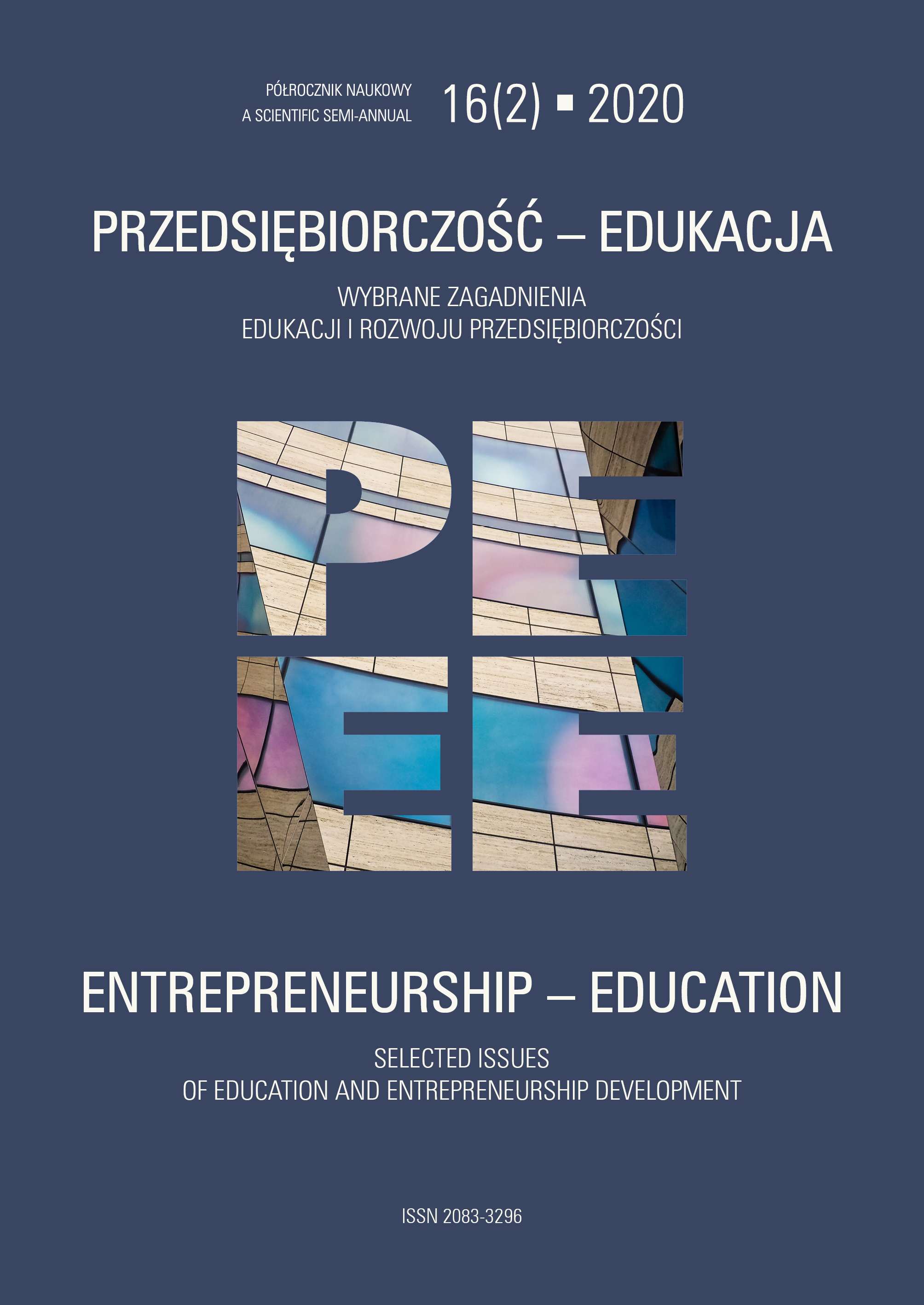Teacher Engagement in Poland: Research Contexts and Support Tool Proposals
DOI:
https://doi.org/10.24917/20833296.162.2Słowa kluczowe:
burnout, Engagement & Beyond, engagement in work, entrepreneurshipAbstrakt
In the process of the effective management of business enterprises and educational institutions, in addition to other factors affecting their success, the involvement of leaders and employees proves to be the critical issue. Enterprises incur a considerable expenditure of time and work on managing and increasing the commitment of their employees, as opposed to the education sector. Effective school management and teacher involvement have a considerable impact on the quality of teachers’ work, and this affects the level of education and upbringing of students. The authors of the study describe the involvement of the work of teachers in four contexts: their professional development, professional advancement system, burnout processes, and the assessment of the effectiveness of their work based their students’ learning. Cooperation within the international Engagement & Beyond project, aiming at developing a practical tool for school management, facilitates the process of understanding the main mechanisms of teacher engagement. The system will automatically adjust the tools for measuring and raising the level of teacher involvement, taking the form both of detailed surveys developed by psychologists and human resource specialists, and materials prepared at the diagnosed motivation level of each participant. School management will be able then to diagnose the level of involvement of employees and create an action plan appropriate to needs at both personal and organisational levels.
Bibliografia
Fullan, M. (2001; 2020, 2 Jaunary). Implementing Change at the Building Level. Paper prepared for W. Owings, L. Kaplan (eds.) Critical and Emerging Issues in Educational Leadership. Retrieved from: http://michaelfullan.ca/wp-content/uploads/2016/06/13396045300.pdf
Hakanen, J.J., Bakker, A.B., Schaufeli, W.B. (2006). Burnout and work engagement among teachers. Journal of School Psychology, 43, 495–513.
Juchnowicz. M. (2012). Zaangażowanie pracowników. Sposoby oceny i motywowania. Warszawa: PWE.
Kahn, A.W. (1992). To Be Fully There: Psychological Presence at Work. Human Relations, 45, 321–349.
Kochanowska, E. (2016). Zaangażowanie nauczycieli edukacji elementarnej w doskonalenie kompetencji zawodowych. Komunikat z badań. Zeszyty Naukowe Wyższej Szkoły Humanitas. Pedagogika, 13, 195–207.
Komunikaty i obwieszczenia Prezesa GUS. Archiwum z 2019 r. (2020, 2 January). Retrieved from: https://stat.gov.pl/sygnalne/komunikaty-i-obwieszczenia/18,2019,kategoria.html
Kulikowski, K., Madej, M. (2013). Zaangażowanie w pracę – problemy z pomiarem. Problemy Zarządzania, 45(1), 99–112.
Leiter, M.P., Maslach, C. (1998). Burnout. In: H. Friedman (ed.), Encyclopedia of Mental Health. New York: Academic Press, 347–357.
Maslach, C., Jackson, S.E., Leiter, M.P. (1996). Maslach burnout inventory manual. Palo Alto: Consulting Psychologists Press.
Maslach, C., Schaufeli, W.B., Leiter, M.P. (2001). Job Burnout. Annual Review of Psychology, 52(1), 397–422.
Oleksa, K. (2013). Wypalenie zawodowe, zaangażowanie i satysfakcja z pracy u osób wykonujących zawody społeczne. Debiuty Naukowe Studentów Wyższej Szkoły Bankowej, 13, 109–124.
Osuch, W. (2018). Kompetencje nauczyciela geografii w świetle reformy systemu edukacji – potrzeba czy konieczność, czego powinniśmy się nauczyć, aby nowocześnie uczyć?. Annales Universitatis Paedagogicae Cracoviensis. Studia Geographica, 268(12), 26–38.
Pawlak, R. (2005). Dylematy polityki edukacyjnej wobec nauczycieli. Polityka Społeczna, 10, 12–13.
Piróg, D. (2012). Poziom zainteresowania pracą w zawodzie nauczyciela wśród studentów geografii. Prace Komisji Edukacji Geograficznej PTG, 2, 194–210.
Piróg, D., Jania, R. (2014). Dokształcanie i doskonalenie zawodowe nauczycieli geografii jako instrument dostosowania się do aktualnych wyzwań rynku pracy. Annales Universitatis Paedagogicae Cracoviensis Studia Geographica, 4, 72–83.
Polska 2030. Wyzwania rozwojowe. (2009; 2020, 2 January). Warszawa: Zespół Doradców Strategicznych Premiera RP. Retrieved from: http://kigeit.org.pl/FTP/PRCIP/Literatura/001_PL_2030_wyzwania_rozwojowe.pdf
Pyżalski, J., Merecz, D. (2010). Psychospołeczne warunki pracy polskich nauczycieli. Pomiędzy wypaleniem zawodowym a zaangażowaniem. Kraków: Wydawnictwo Impuls.
Rakowska, M., Macik, R. (2016). Zaangażowanie pracownika a satysfakcja z pracy – modelowanie zależności z wykorzystaniem PLS-SEM. Przegląd Organizacji, 5, 48–58.
Rappe, A. (2013). Opinie nauczycieli i dyrektorów o systemie egzaminów zewnętrznych na podstawie badań prowadzonych przez zespół EWD. Gniezno: Okręgowa Komisja Egzaminacyjna w Krakowie, Instytut Badań Edukacyjnych, XIX Konferencja Diagnostyki Edukacyjnej, 254–267.
Sacks, A.M. (2006). Antecedents and Consequences of Employee Engagement. Journal of Managerial Psychology, 21(7), 600–619.
Seppälä, P., Mauno, S., Feldt, T., Hakanen, J., Kinnunen, U., Tolvanen, A., Schaufeli, W. (2009). The Construct Validity of the Utrecht Work Engagement Scale: Multisample and Longitudinal Evidence, Journal of Happiness Studies, 10, 459–481.
Sielatycki, M. (2008). Kompetencje nauczyciela w Unii Europejskiej. In: K. Sujak-Lesz (ed.), Kształcenie nauczycieli w szkole wyższej. Wybrane zagadnienia. Wrocław: Oficyna Wydawnicza Atut, 13–21.
CKE. (2019, 13 December). Co to jest EWD?. Retrieved from: http://ewd.edu.pl/wskazniki/matura/coto-jest-ewd/
Szkolak, A. (2013). Mistrzostwo zawodowe nauczycieli wczesnej edukacji. Istota, treść, uwarunkowania. Kraków: Wydawnictwo Attyka.
Watson, T. (2010). Committed to Health: A Large Hospital Network Links Employee Engagement with Patient Satisfaction to Maximise Competitive Strength. Retrieved from: http://www.towerswatson.com/assets/pdf/1549/Healthcare_Case-Study_4–12.pdf
Welbourne, T.M., Andrews, S.B., Andrews, A.O. (2005). Back to Basics: Learning about Employee Energy and Motivation from Running on my Treadmill. Human Resource Management, 44(1), 55–66.
Zahorska, M., Walczak, D. (2009). O osobliwości nauczycielskiej duszy. In: A. Nowak, K. Winkowska-Nowak, L. Rygielska (eds.), Szkoła w dobie Internetu. Warszawa: Wydawnictwo Naukowe PWN, 55–74.
Pobrania
Opublikowane
Jak cytować
Numer
Dział
Licencja
Artykuły publikowane są zgodnie z warunkami licencji Creative Commons (CC BY-ND 4.0; uznanie autorstwa-bez utworów zależnych).

